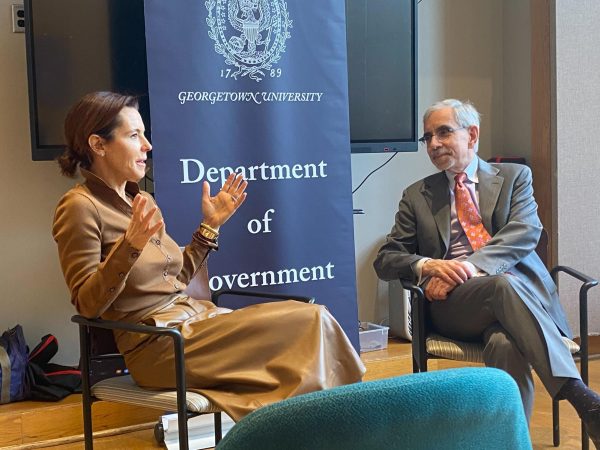An MSNBC host urged students to engage with politics and world affairs amid a rising tide of misinformation in a Georgetown University event April 24.
Stephanie Ruhle, the host of MSNBC’s “The 11th Hour with Stephanie Ruhle” and the senior business analyst at NBC News, argued it is important to stay engaged in order to combat the wave of mis- and disinformation that has accompanied the rise of independent news media. Anthony Arend (SFS ’80), chair of the department of government, hosted the conversation, which aimed to educate the Georgetown community about disinformation in light of President Donald Trump’s first 100 days in office.
Ruhle said misinformation often stems from social media platforms like Facebook, as well as popular podcasts like “The Joe Rogan Experience,” which she said can make erroneous claims with few legal ramifications while traditional news sources are obligated to only broadcast factual information.

“If today I wrote a story that said the milk they serve in schools poisons our children and leads to autism, and I brought it to NBC News and said I’d like to do this segment on ‘The Today Show’ tomorrow, they’d fire me,” Ruhle said at the event.
Ruhle said misinformation arises because alternative news sources, such as social media platforms, lack the regulatory constraints imposed upon traditional news media.
“The problem is that we normalize alternative facts,” Ruhle said. “The problem is that we are no longer saying that the sky is blue and the grass is green, and we have to get ourselves back to a place where we demand it.”
“Instead of saying, ‘I’m going to wait until our politicians are going to do that for us,’ or ‘I’m going to wait until the news business normalizes it,’ we can demand it in our choices of who we elect, where we work, what we like and what we consume,” Ruhle added.
Arend said there is no longer a clear distinction between authoritative and unreliable sources as younger generations increasingly use social media, allowing misinformation to proliferate.
“One of the things we try to teach to students when they’re doing research is you don’t just go online and see what happens on the internet, that there are authoritative sources,” Arend said at the event. “Back in the day, something like The New York Times, they might get it wrong, but whatever it was went through all these processes, and so by the time you read it, the likelihood is it was going to be correct.”
“It’s sometimes hard to be able to convey that to someone who has grown up literally with social media every second, to be able to differentiate between the areas of authority,” Arend added.
Ruhle said she was concerned about how easily conspiracy theories have become mainstream, noting that even though the overwhelming majority of parents in the United States still get their kids vaccinated, it is easier than ever before for people who oppose vaccines to broadcast their opinions.
“Before social media, conspiracy theories lived in basements, in strange conventions, in small groups of people,” Ruhle said. “Now, you actually have conspiracy theorists leading government agencies.”
Ruhle said people should resist the urge to get caught up in viral trends, noting that the truth is rarely simple and exciting.
“I challenge people to dare to be boring,” Ruhle said. “On the network I work on, I am probably our most boring host, but we all have to resist the urge to go viral and follow viral things. And I think one of the reasons going viral and news personalities and misinformation became so prevalent is that’s how people became powerful.”
“The nuanced, complicated truth doesn’t fit in a bumper sticker,” she added.
Ruhle said her audience should think about the origins of the media they consume and emphasized, above all, the value of being educated.
“Every single person has the opportunity, not necessarily to resist, not to speak out against the administration, but to be informed and engaged,” Ruhle said.
Arend said universities like Georgetown must help safeguard the truth even in uncertain times.
“As a university, we are guardians of truth, and one of our goals is to make sure we as faculty are always pursuing the truth, are always questioning our sources, questioning authority — but also in interacting with students, giving them the skills and the tools so they can understand that that’s their goal as well,” Arend said. “In the world where things are falling apart, that’s something that I think we have special stewardship over, especially today.”
Ruhle said she remains optimistic about the ability of individuals to arm themselves in the fight against misinformation even as it proliferates in the current political landscape.
“It doesn’t matter how dark a room is. Even if a room is filled with darkness, it literally takes one candle,” Ruhle said. “It takes one ounce of light to defeat darkness, and every single individual has a chance to be that.”